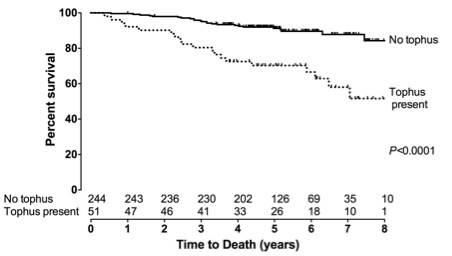Session Information
Date: Tuesday, November 15, 2016
Title: Metabolic and Crystal Arthropathies - Poster II: Epidemiology and Mechanisms of Disease
Session Type: ACR Poster Session C
Session Time: 9:00AM-11:00AM
Background/Purpose: Many studies have reported that gout is associated with increased risk of cardiovascular events and mortality. However, information regarding gout disease severity is limited in these studies and it is unclear how gout impacts on mortality risk. The aim of this study was to determine mortality rates and predictors of mortality in people with recent onset of gout.
Methods: People with gout disease duration <10 years were recruited into a prospective observational study from primary and secondary care settings. Comprehensive clinical assessment was completed at baseline. Participants were prospectively followed for at least one year. Information about death was systematically collected from primary and secondary health records. Standardised mortality ratios (SMR) were calculated and risk factors for mortality were analysed using Cox proportional hazard regression models.
Results: The mean (SD) follow-up duration was 5.1 (1.6) years (a total 1,511 patient years accrued). Of the 295 participants, 43 (14.6%) had died at the time of censorship (SMR 1.96 (95% CI 1.44, 2.62)). Of the 43 participants who died, 26 deaths (60.5%) were due to a cardiovascular cause and 17 (39.5%) were due to a non-cardiovascular cause. In Cox proportional hazards analysis, older age (70-80 years hazard ratio (HR) 5.71, 95% CI 2.02 to 16.19, P=0.001; 80-91 years HR 5.45, 95% CI 1.68 to 17.71, P=0.005), diuretic use (HR 3.09, 95% CI 1.63 to 5.87, P<0.001) and presence of subcutaneous tophi (HR 3.08, 95% CI 1.62 to 5.83, P<0.001, Figure) were independently associated with an increased risk of all-cause mortality. The presence of subcutaneous tophi was the only baseline variable independently associated with both cardiovascular cause of death (HR 2.90, 95% CI 1.29 to 6.51, P=0.01) and non-cardiovascular cause of death (HR 3.86, 95% CI 1.41 to 10.56, P=0.01).
Conclusion: People with gout disease duration <10 years have an increased risk of age/sex/ethnicity standardized death. The presence of subcutaneous tophi at baseline is an independent predictor of both cardiovascular and non-cardiovascular mortality. Figure: Effect of tophi on all-cause mortality. Kaplan–Meier survival plot comparing participants with tophi present at baseline with participants with no tophi at baseline for all-cause mortality. Time axis in years, unadjusted P value is shown. 
To cite this abstract in AMA style:
Vincent Z, Gamble G, House M, Knight J, Horne A, Taylor WJ, Dalbeth N. Predictors of Mortality in People with Recent Onset of Gout: A Prospective Observational Study [abstract]. Arthritis Rheumatol. 2016; 68 (suppl 10). https://acrabstracts.org/abstract/predictors-of-mortality-in-people-with-recent-onset-of-gout-a-prospective-observational-study/. Accessed .« Back to 2016 ACR/ARHP Annual Meeting
ACR Meeting Abstracts - https://acrabstracts.org/abstract/predictors-of-mortality-in-people-with-recent-onset-of-gout-a-prospective-observational-study/
